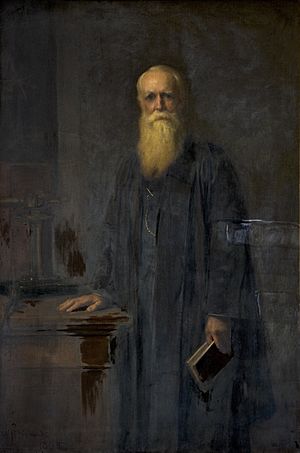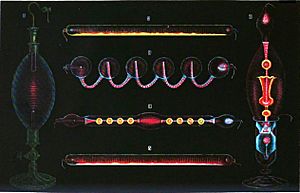Joseph David Everett facts for kids
Joseph David Everett (1831–1904) was an English scientist who taught natural philosophy, which is an old name for physics. He was a professor at Queen's College, Belfast. He made important contributions to how we measure things in science and even invented some cool gadgets!
Contents
Early Life and Education
Joseph David Everett was born on September 11, 1831, near Ipswich, England. His father, also named Joseph David Everett, was a farmer.
Young Joseph went to a private school in Ipswich. After school, he took math classes and was encouraged to become a teacher. He started teaching at a private school in Newmarket in 1850.
In 1854, he went to Glasgow College. He studied hard and earned his first degree in 1856, focusing on classics and philosophy. He then got his master's degree in 1857, specializing in physical science.
Teaching and Scientific Career
After college, Everett worked for a short time at the Meteorological Society of Edinburgh, which studies weather. In 1859, he became a math professor at King's College in Nova Scotia, Canada. He helped build an astronomical observatory there in 1861, which is a place to observe stars and planets.
In 1864, Everett returned to Glasgow. He worked with famous scientists like Lord Kelvin, who was a very important physicist. From 1867 until he retired in 1897, Everett was a professor of natural philosophy (physics) at Queen's College, Belfast.
He was recognized by many important scientific groups. He became a member of the Royal Society of Edinburgh in 1863 and the Royal Society of London in 1879. These are very respected scientific organizations. He also helped lead committees that studied things like how underground temperature changes and how to name scientific units.
Joseph David Everett moved to London in 1898 and continued to attend scientific meetings. He passed away on August 9, 1904, in Ealing, England.
Scientific Contributions and Inventions
Everett wrote many papers and books about physics, especially about how things move (dynamics), light, and sound.
His most famous book was Units and Physical Constants, first published in 1875. This book helped explain the C.G.S. System of Units, which was a way to measure length (centimeter), mass (gram), and time (second) in science.
He also translated a major physics textbook called Elementary Treatise on Natural Philosophy: Physics in 1870. Later, he worked with his daughter, Alice Everett, to translate a book about a special type of glass called Jena Glass.
Beyond his writing, Everett was also an inventor!
- He created his own system of shorthand, which is a fast way to write using symbols. He published this system in 1877.
- He was an early cyclist and invented a special spring attachment for bicycle wheels.
- In 1866, he introduced a type of slide rule called the "gridiron" slide rule. A slide rule was a mechanical tool used for calculations before electronic calculators were common.
Family Life
Joseph David Everett married Jessie Fraser in 1862. They had three daughters and three sons.
His eldest daughter, Alice Everett (1865-1949), became a pioneering astronomer and engineer. This means she was one of the first women to work in these fields! One of his sons, Wilfred, became a professor of engineering in India.
 | Valerie Thomas |
 | Frederick McKinley Jones |
 | George Edward Alcorn Jr. |
 | Thomas Mensah |



